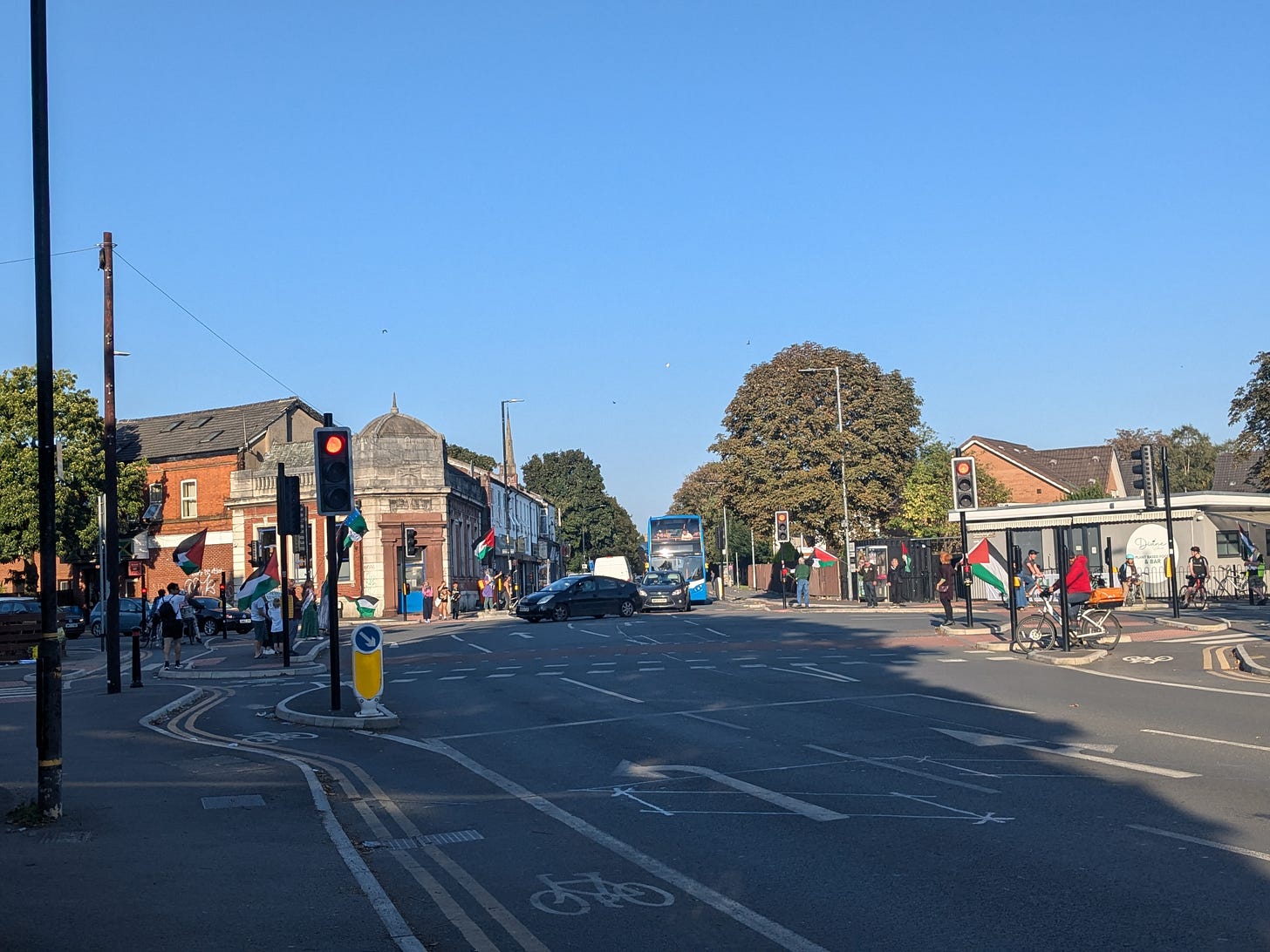Community heroes turn out for Palestine
After 15 months of relentless war on Gaza, a ceasefire has finally been agreed between Israel and Hamas. Last August, I interviewed members of my local community to hear their views.
EVERY Tuesday for the past year peaceful protesters have met at Cross Junction to call for a ceasefire in Gaza.
A crowd of around 20 gather between 5pm and 6pm, proudly displaying their black, red, white, and green Palestinian flags, a scene replicated at vigils in nearby South Manchester suburbs.
The spectacle is a far cry from the “hate marches” Suella Braverman, the former Home Secretary, attributed to those who mobilise across the country to stand in solidarity with Gazans.
On one recent Tuesday, Majid (not his real name), originally from Rochdale stood holding a Palestine flag with the St. George’s Cross pinned to its back. An army veteran and a regular since day one, Majid is unequivocal in his commitment and believes this is “equally an English issue.
“It’s the land of human rights, therefore we’re asking people not to kill others. Simple as that.” He is adamant he will continue showing up “indefinitely” until a ceasefire is agreed.
Simon, a first-timer, explains what drew him to the protest: “Any kind of visibility of the Palestinians is important and really from the people passing and beeping their horns, they share views with the protests.”
As chants of Ceasefire Now punctuate the air, passing vehicles beep their horns, boosting the raised voices: a scenario that echoed the Black Lives Matter protests that took place here in 2020. With a cacophony of encouragement, what the protesters lack in numbers they make up for in volume.
Simon doesn’t hesitate when expressing his reasons for being here: “The easy answer is I’m an academic and one of my key focal points is Israel/Palestine,” says the 50-year-old. He has visited both Israel and the occupied Palestinian Territories as part of his research and has “seen aspects of the occupation upfront as a visitor.” He laments the “structural and overt violence” of Israel’s occupation of Palestine, and argues that it is a “fairly straightforward thing to be supporting the Palestinians at this moment.”
The loudspeaker continues to project chants of Occupation No More across the busy streets and storefronts of the high street, with Simon struggling to detail more of his trip above the din. He met with “minority Israeli Lefties,” who “generally shared the position that Israel as a state had to change and the occupation had to end.”
During his visit he felt conflicted about the contrast of experience between protected spaces like Tel Aviv, and Hebron. “Hebron” he says, is “the most shocking place I went to.”
As a passer-by applauds in solidarity he says: “The thing that is stark in South Manchester is that I see no signs in people’s windows or symbols in the street of people mobilising in support of Israel. That clearly shows in this part of Manchester there is constituency support.”
Even with local unity, the mood is sombre. As for the future, Simon remains pessimistic: “I think the prospects of progressive change in Palestine/Israel are less than they have been.
“Gaza is in ruins. It is still under siege and unless there’s a significant change in the way that politics works there I can’t see how Gaza is going to stop being this besieged enclave which is mostly populated by people who are refugees from 1948,” declares the academic.
Majid, who prefers the word “vigil” to “protest” feels differently: “This will create the political will. This tells them that they’re on the wrong side of history,” he says, referring to governments that are failing to intervene.
Next month marks the anniversary of Hamas’s October 7 attacks, which killed 1,139 Israelis. Israel’s subsequent war in Gaza has so far seen more than 40,000 Palestinians killed, including nearly 16,500 children, and more than 700 Palestinians in the occupied West Bank.
As the hour draws to a close, John, who has been on loudspeaker duty throughout, calls time at 6pm. On cue, the locals put down their placards and bundle their flags into their bags.
John, an American who has resided in the UK for decades, doesn’t pause for thought when asked why he attends every week: “It’s because I have children,” is his stark reasoning.
This community’s message to the wider world is clear: Please, stop this killing of the innocents.




